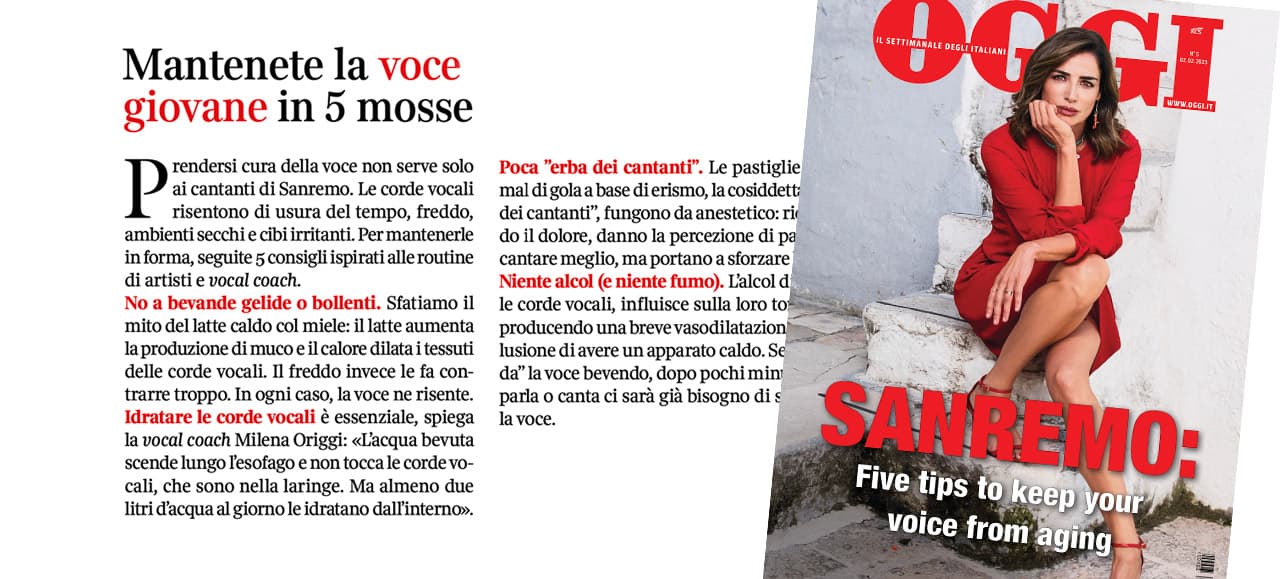Communication skills
Why is it necessary to learn diaphragmatic breathing?

Diaphragmatic breathing, sometimes also referred to as belly breathing or deep breathing, is the natural way in which all human beings begin breathing. Contrary to popular belief, it is not a technique that you can learn; in fact, the opposite is true. As we grow up sometimes, because of posture-related problems, we stop breathing deeply through the movement of the diaphragm and begin to develop a more shallow type of breathing, in the upper part of the chest.
Is it possible to control breathing in moments of stress and anxiety?
Continue reading…Direct and indirect benefits of a public speaking course

Very often people do not understand the importance of a Voice Coach’s work or a public speaking course. This is probably because not all professionals are serious and, above all, competent. Much of the offering of public speaking courses leaves the perception that the results are almost works of magic, achievable by anyone in a few days. They use slogans such as “learn how to charm an audience,” “how to get applause all the time,” or they rely on recorded video tutorials to do their science.
Clearly, not all trainers would offer quick or simplistic solutions to prepare for the heart of the problem of those who want to take this kind of course: overcoming negative emotions and fear of speaking in front of others. But it is one thing to speak in front of an audience of strangers and to have to talk about a topic to which your professional future is linked; it is quite another to speak in front of a small group of people who became instant “friends” on topics about which you care nothing.
In addition, some trainers may overemphasize the importance of “charisma” and “performance” in the presentation at the expense of the substance of the speech. This can lead to making a presentation devoid of content, which on the practical side becomes more of a show than a demonstration of the result of one’s value and commitment.
Continue reading…Motivational speeches: what are they and how to create a memorable one

Motivational speeches are those that aim to inspire and motivate listeners to take action or make positive changes in their lives. They are often delivered by those who have achieved success in their field, overcame challenges, or possess qualities considered unique, but in reality, every day ordinary people, even unintentionally, create equally memorable ones for their co-workers, loved ones, or children.
The main goal of a motivational speech is to transmit a sense of energy and excitement in the audience, helping them to feel more confident, optimistic and strong. In this article we will discuss motivational speeches in simple terms, including their purpose, structure and key elements, clearly through the lens of Inborn Voice voice coaching, the leader in the voice training.
What is the purpose of Motivational Speeches?
Continue reading…Keep your voice young in 5 moves

Ahead of the Italian Song Festival, San Remo, I always get interviewed by some reporter looking for some tips for their readers. This time it is the turn of Oggi, which presents 5 tips to keep your voice from aging.
Here is an excerpt; you can read the entire article in Oggi Number 5, Feb. 2, 2023.
Taking care of the voice is not just for singers. Vocal cords suffer from the wear and tear of time, cold, dry environments and irritating foods. To keep them in shape, follow 5 tips inspired by the routines of artists and vocal coaches.
No to icy or hot drinks. Let’s dispel the myth of hot milk with honey: milk increases mucus production and heat dilates the tissues of the vocal cords. Cold, on the other hand, makes them contract too much. Either way, the voice suffers. Hydrating the vocal cords is essential, explains vocal coach Milena Origgi: “Drinking water goes down the esophagus and does not touch the vocal cords, which are in the larynx. But at least two liters of water a day hydrates them from the inside.”
Little “singers’ herb.” Sore throat lozenges made from erismus, the so-called “singers’ herb,” act as an anesthetic: reducing pain, they give the perception of speaking or singing better, but they lead to straining the voice. No alcohol (and no smoking). Alcohol dehydrates the vocal cords, affects their tone and, by producing a brief vasodilation, gives the il- lusion of having a warm apparatus. If one “warms” the voice by drinking, after a few minutes of speaking or singing there will already be a need to clear the voice.
Secrets to speaking well and making yourself understood

If you are looking for de real tips and “secrets” for speaking well and especially making yourself understood, you have finally found them.
If you have already tried to educate yourself on this topic, you have surely noticed the repetition of solutions and explanations that have nothing to do with “speaking,” that is, using your voice, and especially with making sure that you have been understood: you will have found more tricks and wiles that do not consider at all the way you speak.
Continue reading…
Take the first step!
We offer world-class training to improve your personal, social and business communication skills. We specialize in presentations, leadership, media training, interviewing and Executive speaking.
Inborn Voice shapes tomorrow's leaders.
Book your first online Voice Assessment session by clicking the button below!
Any questions? We'll get back to you!
Are you looking to improve your voice with individual lessons, classes, or have any questions?
Fill out the form below!
and Mylena Vocal Coach:











